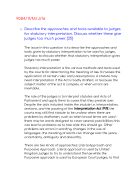Under the literal rule, judges have no discretion as they have to abide by the words of the statute. However, the literal rule may be useless when the solutions cannot be found in the statute or is ambiguous. An experienced draftsman cannot foresee all circumstances. However, it upholds Parliamentary Supremacy.
The golden rule is used to fill in the gaps of literal rule. The judges are allowed to substitute a reasonable meaning in light of the statute. This prevents absurd decision being made under the literal rule. For example in the case of Re Sigsworth, a son wanted to inherit the estate of his mother whom he had just murdered. This would have been possible under the literal rule, however, it would be against public interest. Hence the golden rule was used to prevent a killer from benefiting from his crimes.
Another case is R v Allen where it was an offence to be married to another person in the life of a former husband or wife. Under the literal rule, it would have been possible to go through a marriage ceremony. However, under the golden rule, marriage ceremony would amount to bigamy.
The golden rule bestows more discretion on judges are they allow judges to choose between meaning of the words of a statute. It can be used to avoid perverse decisions being made under literal rule. However, what amounts to reasonable differs from one judge to another.
The mischief rule is laid down in the Heydon’s case. It is said to find out 1. What was the remedy the parliament was trying to provide, what was the problem that the parliament was trying to remedy and what the law was when the statute applied.
The mischief rule is said to suppress the mischief and advance the remedy by giving judges more discretion to interpret laws. For example, in the case of Royal College of Nursing UK, The Abortions Act made it illegal for any abortions not done by a ‘practiced medical practitioner’. This exempts all nurses. However, the act aimed at eliminating illegal backstreet abortions and hence the nurses were not guilty.
In Smith v Hughes, where there was an act to clean up the streets. In this case, prostitutes were tapping on windows, in a balcony beside a street. However, the aim of the act was to allow people to walk by the street without t being solicited hence the prostitutes were guilty.
Mischief rule allows judges to decide cases in a broader way and avoid absurd decisions made under the literal rule. This gives judges more discretion and more legislative power at the expense of parliamentary sovereignty as the mischief of the Act may not be obvious. However, it do have some limitations as it is only applied to fill in the gaps of literal rule and does allow judges to make decisions in changing times, need and social development.
The purposive approach allows judges to look at the positive social approach. It looks at the spirit of the law rather that the mischief of the act as stated in the mischief rule. However it bestows a lot of discretion on judges. Hence judges may seem like they are ‘making laws’. Parliament’s intention of the Act are interpreted by judges to decide on cases.
In the case of Coltman v Bibby Tankers, an employee was killed by the defects of the ship. The Company Liability Act was changed and it was said that ‘equipment’ includes a ship.
This gives judges discretion to interpret act according to changing times and modern development however it may undermine parliamentary Sovereignty.
Judges may use various aids to interpretations such as intrinsic aid which are explanatory notes, preamble, title or extrinsic aids such as Hansards- a parliamentary debate, textbook dictionaries or rules of language(ejusdem generis, noscituur a sociis and expression unius et exclusion alterius)
Judges have certain extent of discretion to interpret laws which differs from each rule. The literal rule has the least discretion and the mischief rule has the most. Judges can also choose to overrule, distinguish, follow or reverse decisions which give them some discretion whether or not to form precedent.








